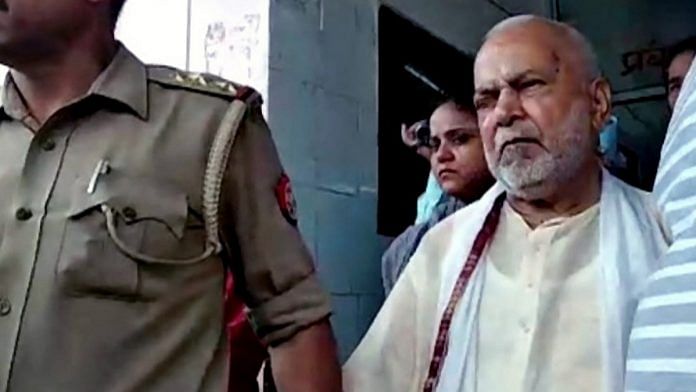New Delhi: Former BJP MP and union minister Swami Chinmayanand, accused of raping a law student inside his ashram in UP’s Shahjahanpur, admitted to “almost every allegation” levelled against him Friday.
He has consequently been charged with Indian Penal Code Sections 506 (criminal intimidation), 342 (wrongful confinement), 354D (stalking) and 376C (sexual intercourse by a person in authority).
However, it is Section 376C that has raised eyebrows, since it uses the phrase “sexual intercourse not amounting to the offence of rape”.
Also read: BJP leader Chinmayanand, accused of raping UP law student, arrested from Shahjahanpur
What does the provision say?
Section 376C criminalises sexual intercourse by a person in authority. It states that anybody in a position of authority or fiduciary relationship, who “abuses such position or fiduciary relationship to induce or seduce any woman either in his custody or under his charge or present in the premises to have sexual intercourse with him, such sexual intercourse not amounting to the offence of rape, shall be punished with rigorous imprisonment of either description for a term which shall not be less than five years, but which may extend to ten years, and shall also be liable to fine”.
This means the provision criminalises the abuse of position by a person in authority, if he “induces or seduces” any woman to have sexual intercourse with him. It adds that “such sexual intercourse not amounting to the offence of rape”, would be punishable with imprisonment of five to 10 years, and a fine.
‘Person in authority’ includes a public servant, a superintendent of a jail, remand home or any other place of custody, and the management or staff of a hospital.
The provision was included through an amendment in 2013, on the basis of recommendations made by the Justice J.S. Verma committee after the 2012 Delhi gang rape case.
Also read: SIT questions law student who accused BJP leader Chinmayanand of rape
‘Strict liability’ offence
According to Delhi-based criminal lawyer Ajay Verma, the provision ensures that even with consent, such sexual intercourse would be punishable.
“Section 376C was framed only with a view that people who are in authority or in a fiduciary relationship and indulge in sexual intercourse involving acts as mentioned in Section 375 A to D, even if with her consent, would be committing an offence under section 376 C and can be punished for five to 10 years,” Verma told ThePrint.
Verma pointed out that a similar provision exists in the Protection of Children from Sexual Offences (POCSO) Act. Section 376C, he said, fixes “strict liability” on those in such positions of authority. The strict liability theory holds people responsible for injuries arising out of certain activities, no matter what the situation.
“Because of the accused person’s high authority, the victim may not oppose and may permit such act by superiors in jails, hospitals, children institutions etc. This is strict liability fixed to punish those persons in power,” he added.
Supreme Court Advocate-on-Record Richa Kapoor, who is also the prosecutor for Delhi Police in the Delhi High Court, echoed Verma’s views.
“This (the section) would mean that if a woman is in custody, then having sexual intercourse, even with consent, would be punishable because of the relationship shared between the perpetrator and the victim… This is a ‘strict liability’ offence. By virtue of the girl being in custody, the accused cannot take the defence of consent… The mere act would be punishable,” she said.
“The Criminal Law (Amendment) Act, 2013, introduced Section 376C to cull out a provision for custodial rape. So, if a woman in custody of this category of people, it does not amount to rape because the consent of the victim is obtained under compelling circumstances. This created a new category of offence, fixing strict liability.”
Also read: BJP’s Chinmayanand has been accused of serial rape again but Shahjahanpur isn’t surprised



